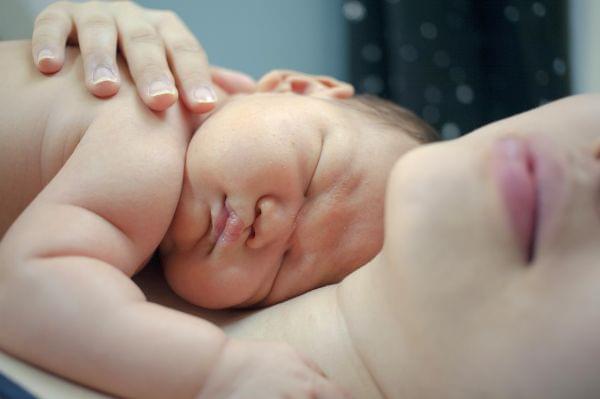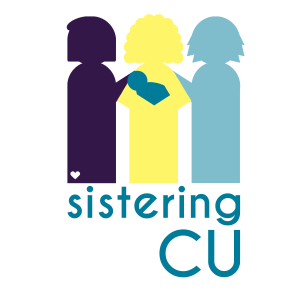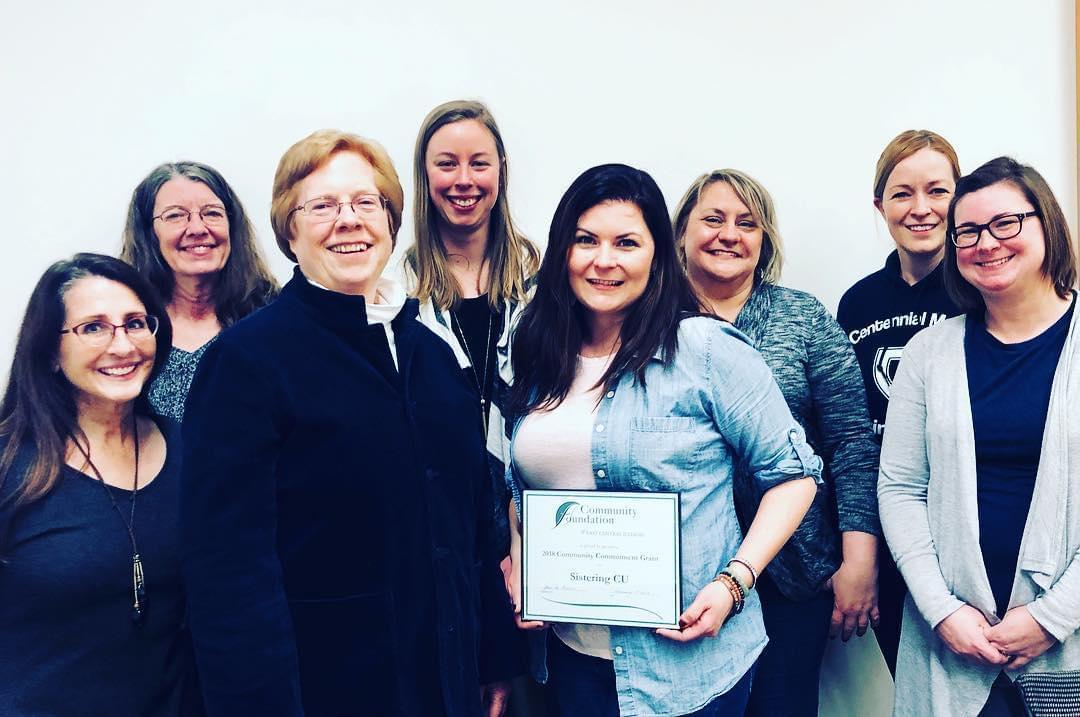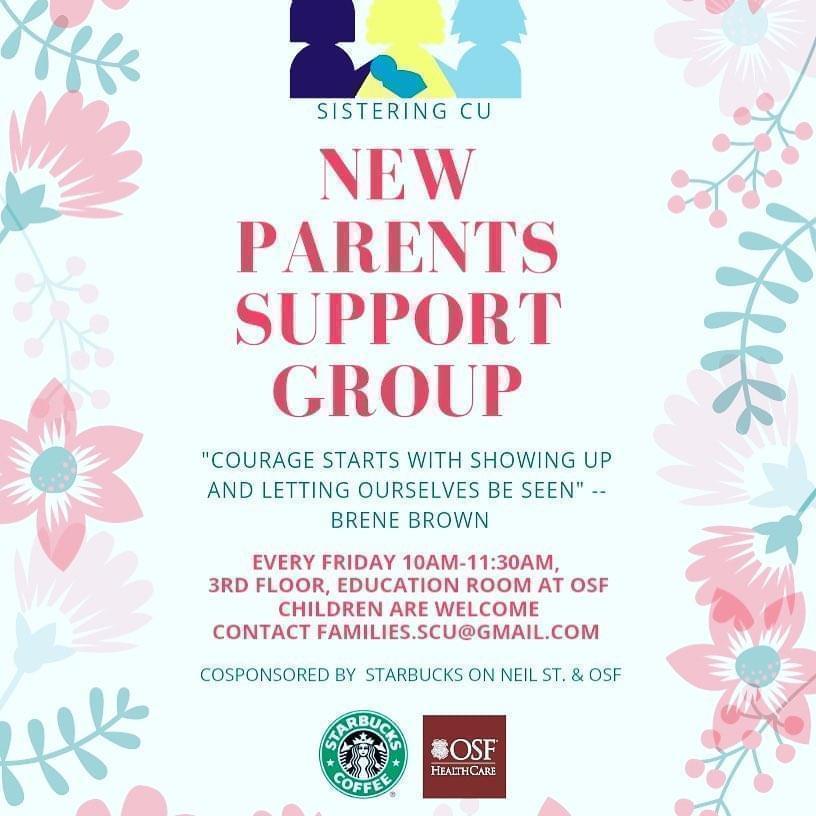Spotlight On Sistering CU: Supporting Moms & Dads After Baby Arrives

angel4leon/pixabay (CC0)
Bringing home a new baby is tough, and a nonprofit organization in Champaign-Urbana wants to help.

Sistering CU offers free home visits from trained volunteers to families with babies age newborn to six months. They also recently launched a support group for new parents in the Champaign-Urbana area, in partnership with OSF Medical Center in Urbana.
“I think one of the hardest things is to know that it’s normal to need help, and to want help at the beginning,” said Erin Murphy, co-founder and executive director of Sistering CU.
Murphy spoke with Illinois Public Media about a new initiative to promote safe sleep habits and support new families in the early stages.
This interview has been edited and condensed for clarity.
I think one of the hardest things is to know that it's normal to need help and to want help at the beginning, and we don't have to do it all on our own."Erin Murphy, Sistering CU
What is Sistering CU all about?
Sistering CU is a nonprofit organization run entirely by volunteers. We target families who have just had a baby, whether that's through adoption or birth. Our programs focus on sending a volunteer to go to their home for two hours a week for 12 visits to help them as they recover and transition to becoming a mom becoming a dad and getting used to having a family life. It takes help to do that, we believe.
There's a new grant-funded effort that you are doing right now involving Baby Boxes. What are Baby Boxes are and what purpose they serve?
Baby Boxes are an idea that was developed first in Finland in the 1930s, and today, every single family in Finland gets a baby box. The box serves a double purpose. It holds diapers, bottles, things that you might need for bringing home a new baby. But the box itself is also a safe place for the baby to sleep, like a bassinet. You can move it from room to room, because it's a cardboard box, but inside, there's a mattress and some sheets.
So it's a comfortable, lightweight, safe place for the baby to go from room to room, or to sleep on the floor next to you. And it's shown to reduce rates of SIDS for families that don't have a place that's safe for baby to sleep.

Sistering CU co-founder Erin Murphy (center) holds a certificate from the Community Foundation of East Central Illinois, which awarded the organization a grant to purchase Baby Boxes for new mothers.
We are so excited that we got a grant for the Baby Boxes from Community Foundation of East Central Illinois. We have 50 boxes that we're going to be assembling and putting in little gifts for the baby and then collecting donations from local businesses that want to also support families with new babies.
What are you looking for in terms of donations from people in the community or local businesses?
Well, if you're a parent, or know parents, and think of things that made you feel really supported, those are the kinds of things we're looking for, like herbal tea, coffee, lavender essential oils, bath salts, lip balms, little lotions, candies, gum, you know, anything that you can think of that made you feel a little bit, like: This feels so nice to have this kind of self care right now.
Why did you decide to pursue this particular effort in addition to the other services that Sistering CU offers?
When we first started the idea of Sistering CU, the baby box idea had just kind of gone viral. So this was like in 2016.
We come with no agenda, we're not there to educate about anything unless they ask. We're just there to be helpful."Erin Murphy, Sistering CU
In some states, like Virginia, I learned every new family is sent home with a Baby Box?
Yes, there are some other states like that: New Jersey and Louisiana had a program as well. So when we heard about this idea, we were so inspired because it's both a practical, useful tool for the family, and also a symbol of support, like, what you're doing is really important, it really matters, it's good for the community for you to be healthy, for your family to be healthy. And we thank you, it's like a thank you gift for having a healthy family and doing your best. And we just love that. We're just thrilled to be able to start the program. Fifty boxes is a small start, but it's start.
What can people do if they're interested in referring someone to what Sistering CU offers or to be a recipient of one of these baby boxes? How does that work?
They can go to our website, SisteringCU.org and sign up. The main requirement is to have a newborn, from zero to six months. Because a lot of times what happens is -- we think we can do it, we think, Oh, other people do it, it's fine, I'll be able to do it. And then we get into the thick of it and we're exhausted and we're barely treading water and we need help. So we want those people to also ask for help, because we have volunteers who've been there and who want to help, who know that maybe someday they will be there and they want to help too. We come with no agenda, we're not there to educate about anything unless they ask. So if they want resources on breastfeeding, we can hook them up with that, but we're not there to tell you you need to breastfeed or that this is the best way to do it. We're just there to be helpful to you.
So if you need us to throw in some food in a slow cooker, throw in a load of laundry, wipe the countertops down in the kitchen, talk to you about what you're experiencing, just kind of witness the experience, because everything's changing so quickly when they're that young and it's just nice to just decompress and discuss it sometimes. At least half of our families just want to talk to another adult about it. The other half might want a nap.
You also recently started a new parent support group. Can you tell me about that?
It's co sponsored with OSF in Urbana, so we hold it and on the third floor in the education room. It's open to anybody with a new baby. You don't have to currently be in our program. Starbucks on Neil's another co-sponsor, so we always bring in Starbucks coffee and a whole bunch of yummy treats. Kids are also welcome; we bring one of our volunteers in and we have a little space for the babies to kind of lay down on the ground with some toys there, right in the room with us. And we just talked about the highs, the lows, and the in-betweens.
We share tips, like what worked for you for sleeping, what didn't work for you? And the truth is, some babies just don't sleep. And that's okay, and we can talk about it. and it doesn't mean you're a bad mom or dad that you can't get your baby to take two-hour naps.
We have increasing mortality rates for mothers across the board, but it's far worse for mothers of color."Erin Murphy, Sistering CU
There are some other events planned for later this spring. Can you tell me about this one coming up in May?
Yes. May is Perinatal Mood Disorder Awareness Month, and we have had an educational event about that in previous years. This year, we want to focus on racial disparities and maternal health and reproductive justice.
In the United States, we have increasing mortality rates for mothers across the board, but it's far worse for mothers of color. So we want to unpack that: What does that mean for our community? What does it mean for our nation? And what can we do about it?
First, we're going to define the problem as as best we can: what we know. And we're going to show a 30-minute PBS documentary, "When The Bough Breaks," from a series called "Unnatural Causes," to discuss the disparities in maternal health across races.
What researchers find is that the chronic stress of racism affects maternal health outcomes and one of the inspirations for Sistering CU is: What can we do to support mothers? Across the board, mothers are stressed and need help. But particularly, if you are experiencing chronic stresses from poverty or racism or a stressful home situation, then your health outcomes are going to suffer. So we want to be there to support and do whatever we can do to alleviate some of that chronic stress.

We can't do it all because it is structural and we need to change the structures to make that happen. But starting a conversation is at least one place where we can start working on that. So we'll have a panel of local experts who know this issue, who know the resources we have in our community and can begin discussing what we can do. Yeah, and
That event will be at 7 pm on May 21 at the Champaign Public Library.
Anything else you'd like to share?
We are recruiting more families. I think one of the hardest things is to know that it's normal to need help and to want help at the beginning, and we don't have to do it all on our own. It takes a village and we have lost our villages around us, living in a transient community or far away from grandparents or our close friends and neighbors who would have helped us.
We want to be that village. We just want to be there and support you because we do believe what you're doing is really important. We believe you're important. So we just want to be there to support you.
So, you're always looking for more volunteers who can provide that type of support, and you're always wanting to hear from new families who want help?
Absolutely. Our program has four phases at this point. In the first phase, we help mothers develop a postpartum plan. It's like a birth plan, but for postpartum. So, what are the resources you have available to you that you can plan and sketch out so that when you're so exhausted, and you're having this issue -- whether it's sleep, breastfeeding, or just struggling and feeling like I need somebody to help me -- we have resources, both locally and nationally, that can help us through those moments. And Sistering CU is one of those places that can be there for you. We also have other home visiting programs, a lot of them, actually, in our community. We can hook you up with them to get further resources.
Phase Two is the home visiting program. Phase Three is the parents group meetings. So after those 12 home visits, when the volunteer stops coming, you can come to the parent group meetings and still have that support around you.
The fourth phase after that first year is when you can give back -- whether you want to mentor another mom, whether you want to volunteer to the home of another family, or help us fundraise, or you have some other skill set that you would like to contribute, you can give back at that point. Because other than that, it's an entirely free program and we just believe in paying it forward and being able to foster that community.
Follow Christine on Twitter: @CTHerman
Links
- Sistering CU Provides Support For New Parents
- How Home Visits From A Nurse Can Improve The Lives Of Low-Income Moms & Babies
- Childbirth Class Teaches Mindfulness Techniques To Relieve Pain, Prepare For Parenting
- Mindful Parenting; West Nile In Illinois; ‘Flyover Country’ App For Science Info About Your Flight
- Maternal Health Advocates Urge Insurers To Cover Costs Of Birth Doulas
- Illinois Issues: How Race Factors Into Infant Mortality
- Illinois Passes A Budget; Mortality Rates For Black Mothers And Infants; LGBT Pride In Southern IL
